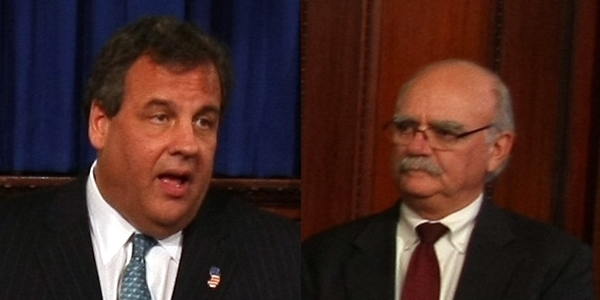Christie enlists ‘problem’ aide to solve NJ’s $800M budget crisis

GAP: Gov. Chris Christie and Lou Goetting, his double-dipping deputy chief of staff, try to plug $800 million budget gap.
By Mark Lagerkvist | New Jersey Watchdog
The irony of New Jersey’s latest budget crisis is getting thick in Trenton as Gov. Chris Christie turns to Lou Goetting for help.
Christie is scrambling to plug an $800 million gap before the state fiscal year ends in less than two months.
“I’m going to use every tool at my disposal to get a balanced budget,” Christie declared at a news conference last week. “There’s nothing off the table.”
One of those “tools” is Goetting, Christie’s deputy chief of staff and budget guru, sources told NJ Spotlight. However, Goetting personifies a problem that helped cause the mess.
Goetting (pronounced “getting”) gets $228,860 a year from state coffers — $140,000 in salary plus $88,860 from a pension. New Jersey Watchdog investigations have found he is one of many double-dippers who collect two sets of checks despite Christie’s pension reforms.
Such excesses have contributed to a $51 billion shortfall in New Jersey’s public retirement system. Trying to keep pension funds solvent for the future, Christie and the Legislature agreed to mandate increases in the state’s long-neglected annual payments.
The next installment of $1.55 billion is due before the fiscal year ends, as required by state statute. That is also the state’s deadline to come up with $800 million to balance its budget, as required by the New Jersey Constitution.
If anyone knows how to game the system, it’s Goetting. In addition to his double-dipping, he has received $370,000 in golden parachute payouts from public institutions.
In 2003, Goetting took an early “retirement” from state service after he was forced out of his position as a vice president of the University of Medicine and Dentistry of New Jersey, now part of Rutgers.
As part of a negotiated settlement, Goetting received $180,525 in severance pay from UMDNJ — plus a company car, cell phone, laptop, secretarial services and other perks. UMDNJ refused to disclose the reason for his departure.
He also started drawing a state pension, now $88,860 a year.
Goetting soon became a double-dipper. He was hired by Brookdale Community College in Monmouth County as an executive vice president and returned to the public payroll in August 2003 at a salary that reached $162,000 a year.
After four years at Brookdale, Goetting had worn out his welcome. He signed a severance agreement with the college in October 2007.
The deal included a payout of nearly $190,000 plus perks. Goetting received a six-month paid leave of absence at full salary ($81,000), a one-year “transitional sabbatical” at half-salary ($81,000) and $27,500 in vacation pay.
He was allowed to keep his college email, cell phone and laptop computer until June 30, 2009, his official day of separation with Brookdale. The college also agreed to provide Goetting with a letter of reference — and promised not to say anything “disparaging” about him.
Brookdale officials claimed they had no record of why Goetting was terminated.
In 2010, Goetting joined the Christie administration as the governor’s budget expert on cutting the cost of government — and unofficial mastermind on the art of double-dipping.
Christie and Goetting declined comment to New Jersey Watchdog, but the governor’s office did release a statement to PolitickerNJ.com in 2011.
“Lou Goetting is an invaluable member of the administration with an incredible level of expertise in state, county and local government budgeting and administration and public financing stretching back decades,” spokesman Michael Drewniak told the website. “The governor called him out of retirement for that reason, and we are grateful to have him.”
While Christie didn’t invent double-dipping, the self-styled reform governor has done little to end the practice. For example:
- Of 60 double-dippers in the executive branch, 19 were hired under Christie, New Jersey Watchdog reported in 2012.
- A subsequent New Jersey Watchdog investigation last year identified 80 State Police retirees who returned to the state payroll full-time as double-dippers.
- Adam Heck, the governor’s associate legal counsel, gets a $44,818 a year state disability pension in addition to his $110,000 salary.
- Heck is one of 18 “disabled” state employees who collect salaries for working plus disability pensions because they supposedly can no longer work, New Jersey Watchdog discovered.
Heck and Christie declined comment, yet the governor criticized disabled double-dippers earlier this year in his State of the State address.
“Our pension system is burdened by some who collect disability retirement because they claim they are ‘totally and permanently’ disabled, but are now working full-time,” said Christie.







